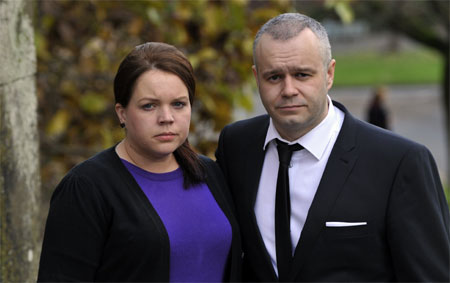The family of E. coli victim Mason Jones is seeking a judicial review to determine if there should be a fresh inquest into his death.
 Five-year-old Mason, of Deri, near Bargoed in Caerphilly county, died after contracting E. coli O157 poisoning during the 2005 South Wales outbreak, caused by rogue butcher William Tudor.
Five-year-old Mason, of Deri, near Bargoed in Caerphilly county, died after contracting E. coli O157 poisoning during the 2005 South Wales outbreak, caused by rogue butcher William Tudor.
Following an inquest into his death in 2010, which brought in a neutral narrative verdict, his mother Sharon Mills vowed to “fight on for justice” for her son.
The E. coli outbreak struck 44 schools in the South Wales Valleys throughout 2005 and became the second biggest to hit the UK by the time it had run its course.
More than 150 people were infected after butcher William Tudor, the owner of John Tudor and Son, based at Bridgend Industrial Estate, supplied meat to dozens of schools and residential homes for the elderly at the time.
The public inquest in 2010 heard how Tudor put cash before hygiene for years and may have caused other food poisoning outbreaks.
It was claimed he bought cheap frozen New Zealand mutton and passed it off as prime Welsh lamb and staff who brought him rotten meat unfit for consumption were told to “mince it up” and use it in faggots.
He was jailed for one year at Cardiff Crown Court in 2007 after admitting six counts of placing unsafe food on the market and one of failing to protect food against the risk of contamination.
During the inquest into Mason’s death, Gwent Coroner, David Bowen, concluded a lack of good food hygiene standards at Tudor’s meat processing plant led to Mason’s death but said there was not enough evidence to prove he could have foreseen “a serious and obvious risk of death” and delivered a neutral narrative verdict.
Since Mason’s death in 2005, Ms Mills, has also been campaigning to improve food safety and was at the forefront of the campaign to make the display of food hygiene scores mandatory.
The judicial review will be held at the Civil and Family Justice Centre in Cardiff on Tuesday to determine whether or not another inquest should be held.

.jpg) month, had eaten cold gammon and turkey supplied by butcher William Tudor.
month, had eaten cold gammon and turkey supplied by butcher William Tudor. recommendations from the public inquiry had been implemented.
recommendations from the public inquiry had been implemented.